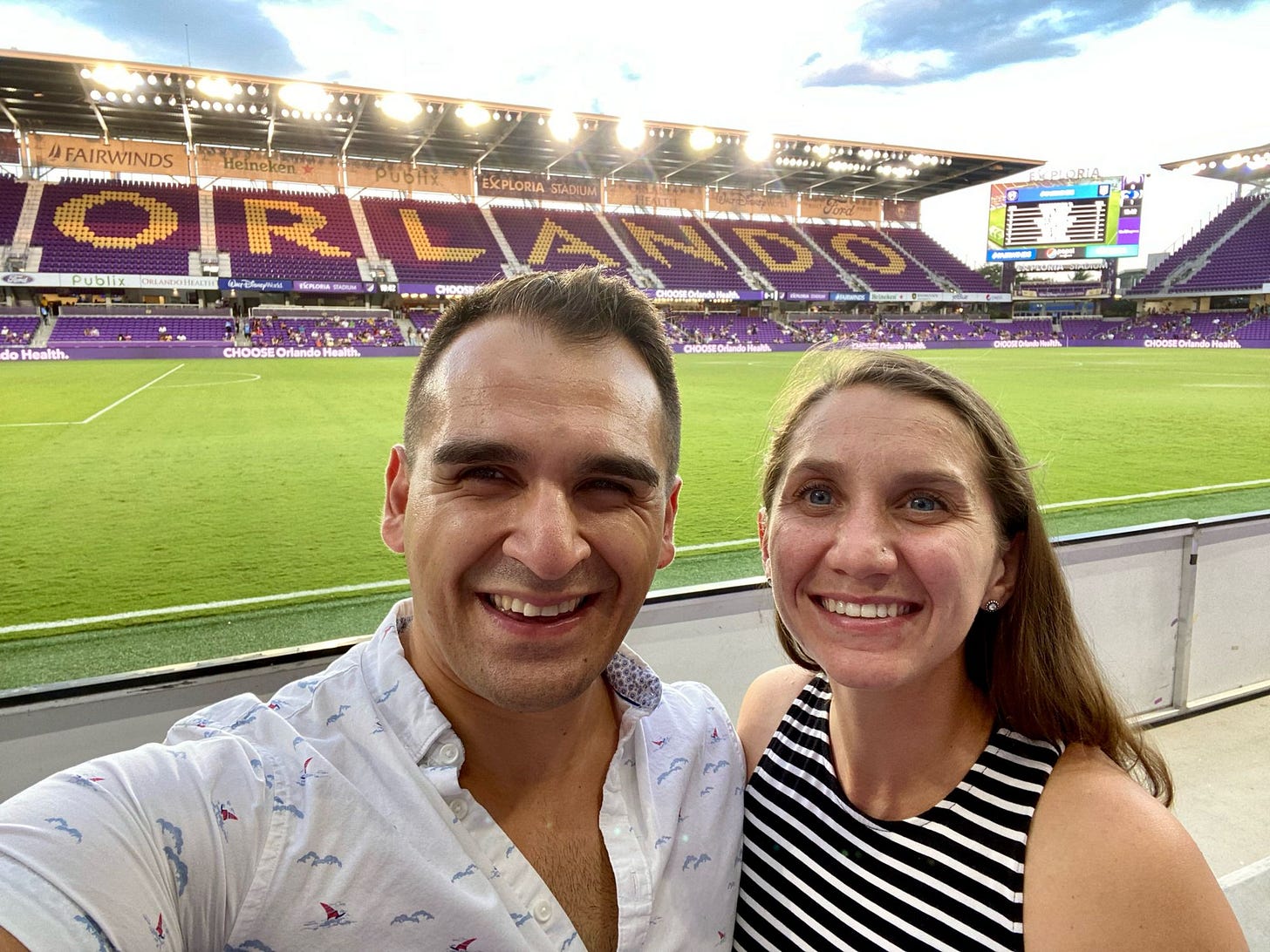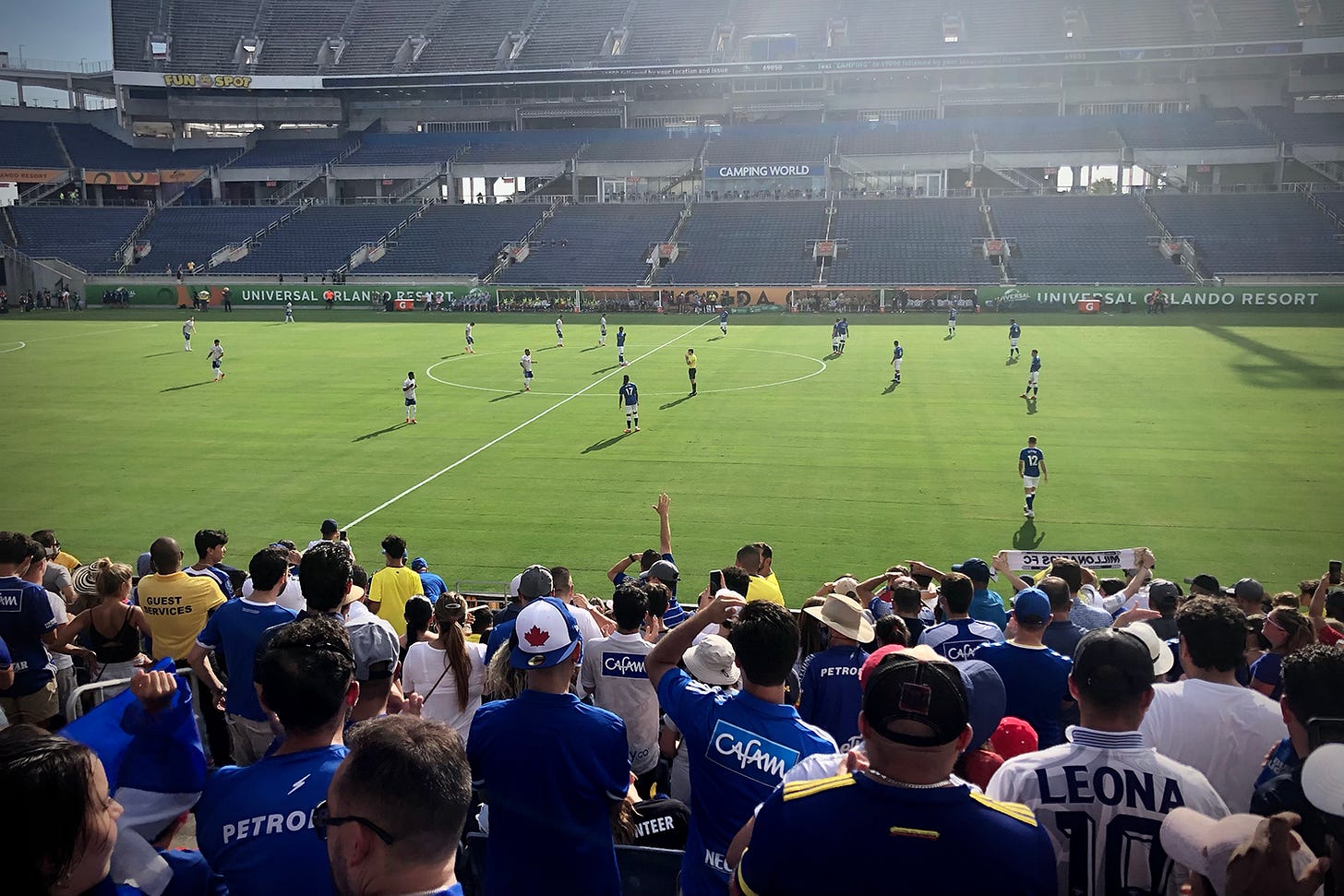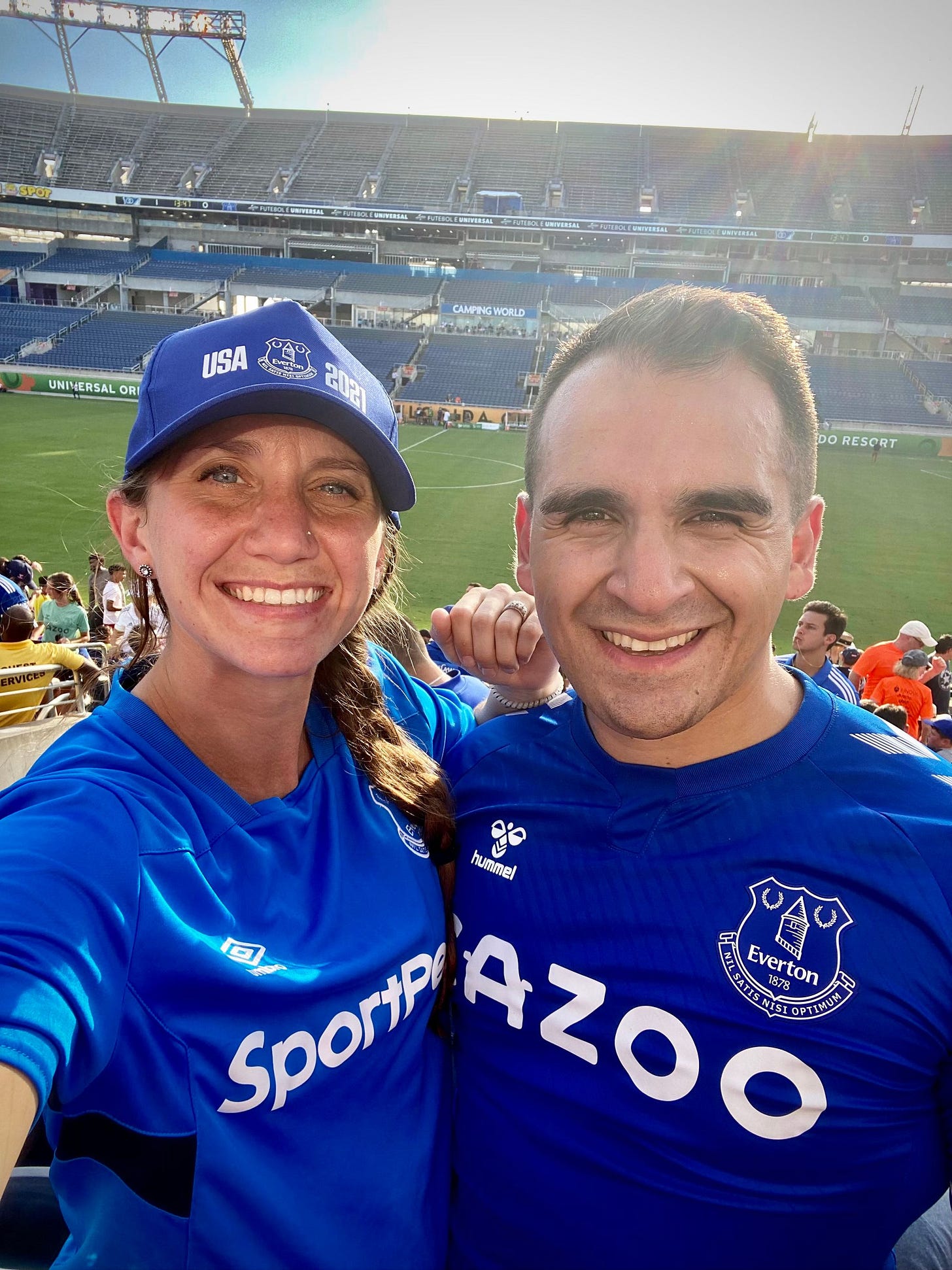36 Hours of Soccer in Orlando
A meandering reflection of my third wedding anniversary spent at stadiums with the only woman to ever fully accept my obsession with the beautiful game.
My wife had sent the first text after church on Sunday, May 23. Would you be interested in going to Cary NC for our anni and seeing NC courage play Orlando? I was at McKay’s and must’ve missed it; I responded with a picture of a shelf of Kristen Hannah books.
Ten days later, Everton announced, to my surprise, that they would travel, for the first time in eight years, to the United States to play a late July tournament against Italian champions Inter Milan, Colombia’s Millonarios, and fellow English Premier League side Arsenal. My phone screen flashed like a strobe light with GroupMe messages from other Knoxville Evertonians making arrangements to get to Orlando.
I was sitting in my office at the university. The car was in the shop the same day, and I was stressed about money. Our third wedding anniversary was July 21, and there was little chance, in my mind, Haley would be willing to alter plans. We were supposed to spend our anniversary weekend in Bryson City, North Carolina relaxing by a river in the mountains—not sweating through our underwear in Orlando watching a mediocre English soccer team lose a game to a mediocre South American team she had never heard of before.
She texted me: Babe, we gotta get Everton tickets!!
Within 30 minutes, the Airbnb and flights were booked.
So there we were last Saturday, sitting on the pavement beside the unmowed lawn of the small house just south of downtown Orlando counting lizards as the old Cuban landlady hurried to change the sheets and mop the floor with Fabuloso. Haley had read that the Orlando Pride—the professional women’s team, which features Brazilian legend Marta and Alex Morgan (both away at the Tokyo Olympics) and Sydney Leroux, a mom of two and Haley’s favorite player—were playing that night. So we got tickets in advance.
Two games. Two nights.
There is no other way I would’ve wanted to spend my anniversary weekend.
I’ve written about my relationship with the beautiful game in lots of places—a poem for my dad, an essay about my childhood idol, an essay about my daughter, a short story about a World Cup-winning penalty kick.
My first love was a soccer ball. After becoming a Christian in my late teens, I always made it known to women I dated: First, God. Then, family. Then, soccer. You’d still be in the top five! In those days, I spent every Saturday with my grandfather watching European club soccer games from 7 a.m. until the last Italian Serie A game ended around 6 p.m. At least four nights a week in the spring, summer, and fall, I was in the park behind my parent’s house playing pick-up games with the immigrant laborers who flooded the fields, much to the annoyance of the American Bayonneans who played adult league softball and collided with us in the outfield. In the unlined grass, we set up makeshift goals with backpacks and T-shirts and played lopsided games for hours with up to 13 players on a team and no out of bounds.
Because I lived close to Red Bull Arena and the Meadowlands, I also got to see plenty of professional soccer, from the Metrostars/New York Red Bulls to the national teams of Ecuador, Colombia, the United States, Argentina, Jamaica, Guatemala, and others.
It’s fair to say, I never thirsted for the beautiful game before I left New Jersey.
At 22, when I arrived in Knoxville, I immediately noticed the difference. There were no Mexicans or Egyptians setting up goals in the grass and playing with their friends after work. The fields were empty. To watch any level of professional soccer, I had to drive two-and-a-half hours west to Nashville for the rare international fixture (which I did, in March 2012, only to see the U.S. under-23 men lose 2-0 to Canada, failing to qualify for the first of three-straight Olympic Games).
Eventually I connected with a group of Chinese graduate students at UT who played pick-up every Saturday at Liberty Street or the university’s TRECS fields. I joined pay-to-play indoor soccer leagues. In 2015, I wrote about the transplants and immigrants who play in these leagues, Knoxville’s primary source of recreational adult soccer, for my master’s degree project; my reporting was later published as a cover story for The Knoxville Mercury.
I met Haley playing in one of these leagues in 20161.
It was hard not to notice her. She was pretty and aggressive. She argued with referees, tripped opponents, and scored goals with her left foot, her sweaty sideways ponytail bouncing off her shoulders the entire time. I was worried she looked too young, but my friend Kelly, who captained the first team we all played on together, told me she was at least 21. She also told me Haley had a teenage sister, and they were close. In an attempt to spark up a conversation, I told Haley I coached girl’s club soccer, and that we were always looking for players. She didn’t make eye contact; she just said, flatly, she wasn’t interested in getting her sister on a soccer team.
For nearly two years, I knew nothing about her. But I saw her on the fields I played on every week. She showed up minutes before games, hardly talked to anyone, played, and left without saying goodbye.
In June 2017, after a night of tryouts at Emerald’s soccer fields outside Fort Sanders, a buddy called out to me as I walked to the parking lot. Hey man, we’re about to play a game. Adult league. We need another player. You want to play with us? I wasn’t interested; I was tired and hungry for tacos de tripa. But the pretty girl with the sweaty ponytail spoke up after him: Come on, you should play.

We had planned our first night in Orlando as our anniversary night. At 5, we ate an early dinner of Korean-fried cauliflower florets, pork belly biscuits, and split a burger with fries and mac and cheese from a nice restaurant downtown. From there, we left on scooters for Exploria Stadium.
Walking to our seats, I teared up seeing the little girls in their Pride jerseys. We sat in the corner, beside one of the goals, five rows up. Across the aisle, as the announcer called out the names of the starting XI, an older lady, probably in her 70s, wearing an Alex Morgan jersey, hoisted herself up by a metal cane and swung a Pride scarf around each time a player's name was called.
Even as we analyzed the game together, as we listened to the Supporters Section beat their drums and chant in Spanish to cheer on the team2, I couldn’t pull my attention away from the thought: my daughter will never have this. The closest professional women’s team to Knoxville is a four-hour drive north. Little girls in Orlando (and Louisville, Kansas City, Cary, Washington D.C.) get to grow up with role models they can see and touch, whose jerseys they can wear, whose songs they can shout from the stands. Alba doesn’t.
It’s a silly thing, this game: 22 players running around after a ball they try to kick into each other’s nets. But it’s also the field on which I learned so much about myself. The classroom that taught me to find common ground with people I don’t know, whose culture or language I don’t share. To stick up for the man beside me. To be brave. To lead. To encounter an obstacle and push through it, even if victory doesn’t lie on the other side.
I could fill a book with the lessons I’ve learned on a soccer field.
But the most important thing soccer gave me will always be Haley.
The Pride lost 2-0. Ashlyn Harris saved a penalty kick just in front of us—the most exciting moment of the game. We didn’t buy jerseys or meet any players (though we did come close enough for Haley to snap a few pictures of fellow supermom Leroux walking the field afterward with her two kids). Near the tunnel, girls waited for their heroes to come by and sign their jerseys. They captured the memories in selfies on their iPhones. What that will mean for them one day, I can only imagine.
The real purpose of the trip was Sunday’s Everton game. Because Inter and Arsenal pulled out of the tournament due to COVID-19 infections and fear of infections, the organizers of the Florida Cup hustled to find replacements. They refunded our original tickets, sold general admission tickets for $20, and upgraded Sunday’s semifinal to the championship game.
In the morning, we ate brunch at a place called Island Time, where, according to Instagram, they occasionally serve customers in full drag. I had a Dominican dish called mangú and Haley had biscuits and gravy. We walked around Lake Eola Park and bought food from Publix to eat before the game.
At 4:30, we took an Uber to Camping World Stadium, where we were warned by our driver, Juan, not to venture far if we wanted to keep hold of our phones and wallets. Everton and Millonarios fans were everywhere—the latter far outnumbered the former. Somehow, the Millionarios fans, whose banners indicated they came from Atlanta, D.C., South Carolina, and Miami, had gotten tifos, flags, and smoke grenades into the stadium. For the entire game, they bounced and sang like they were in South America.
We sat with four other Knoxville Evertonians and their wives or kids. Another friend, Jack, had done the same thing we did, and labeled the weekend his anniversary trip. In order to sell more water and beer, the tournament organizers closed off the shaded side of the stadium and stacked us like anchovies on the side where the sun was unrelenting for the first 70 minutes of the game. 100-degree heat, 100-percent humidity. Haley's face turned red. and I sweat straight through every piece of clothing I had on.
The game was as bad as I expected. Millonarios went up 1-0 in the first half. Everton equalized on a penalty kick in the second. Since they were playing for a made-up trophy, the game went to penalty kicks, where Everton won 10-9 after goalie Asmir Begovic, who’s only been with the team for two weeks, scored a PK and then saved the kick from his opposite number.
Everton were the Florida Cup champions. And, after a pit stop for pizza downtown, Haley and I were ready to go home.
The field was at a place called Fuse, a sports facility on one side of a much larger building owned and operated by a church. Soccer has been played in that facility for more than two decades. The facility is now owned by a local youth soccer club. I probably played at least 300 games on that field from 2012–2019. I even had my own Sunday night team, Rosario Central, named after my favorite soccer club in Argentina. We never won a championship (prize: a free T-shirt and a photo for Facebook) but, for two seasons, we were a fun-to-watch and infuriating hodgepodge of Mexicans, Hondurans, Scotsman, Belarrusian, and Americans.
Unlike in American sports culture, soccer clubs typically have groups of super fans who get together and write songs for the teams and their players. At the games, they play instruments and lead the chants in the stadium. Argentina is known for its very passionate fanbases, and many of the songs that are sung in stadiums across the Americas originated in Argentina. In the U.S., I'm always surprised to hear these songs in Spanish, with the names swapped out for whatever team is playing. It’s a unique part of soccer culture I cherish. A BBC story from 2014 about American soccer fans of D.C. United singing team songs in Spanish is easily searchable on YouTube.






